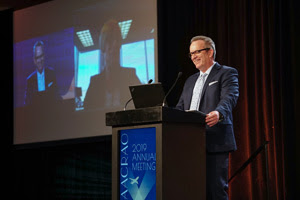
The U.S. Education Department is currently in the midst of rulemaking on a wide range of higher education issues. Principal Deputy Under Secretary Diane Auer Jones joined AACRAO Executive Director Mike Reilly for a virtual General Session on Monday at the association’s Annual Meeting to discuss the negotiated rulemaking process, the agency’s proposed regulations, and other issues impacting the membership.
Main points of discussion
Under Secretary Jones began by stressing that the department’s proposed agenda on higher education is not an attempt to blow up the current system and start from scratch. Instead, the goal is to improve the current system by making it more streamlined and by providing more flexibility to institutions to better serve students.
The department is conducting its final week of rulemaking on accreditation, distance education and innovation, and TEACH grants and faith-based initiatives. Jones signaled that she is hopeful that consensus will be reached. With such great diversity in topics being negotiated, the regulations that emerge from this process will be enormously impactful on students and institutions. As such, Jones noted the careful thought and thorough discussions of negotiators and committee members to develop language that addresses current issues affecting institutions and avoids unintended consequences.
On the specific topics of transfer and the federal definition of the credit house, Jones acknowledged that the department initially issued big and bold proposals. She stated that the agency has a limit role and that institutions do and should ultimately have control of what determines transfer. However, she pointed out that it is still difficult for many students to transfer, which has a cost to both the department and to students, and urged institutions to move away from unilateral decisions and to improve the overall process for students.
With regard to the credit hour, the department thought there was support for movement away from seat-based credit hour measures. After many discussions with negotiators, however, they realized that the current definition, with some adjustments, remains the most agreeable option. While negotiators on the rulemaking committee do not cast their final votes until Wednesday, Jones said that there seemed to at least be consensus on seat time.
In addition to the rulemaking updates, Under Secretary Jones also touched on several other department initiatives, including experimental sites on Federal Work Study, Second Chance Pell, dual enrollment, and risk-sharing; grant programs; and new technology for federal student aid.
Federal updates
Prior to the General Session, AACRAO Director of Government Relations William Gil, Director of the Office of Student Finance at the University of Minnesota and AACRAO Board President Tina Falkner, and AACRAO Association Director of Government Relations Michelle Mott provided a federal update to attendees. Tina Falkner, who also currently serves as an alternate on the department’s rulemaking committee, provided insights on her experience in the negotiations, how it differed from previous neg reg proceedings, and the latest proposals from last week’s session. Of particular concern, Falkner highlighted the very telling public commentary that has been heard throughout the process. Military veterans who were lured into sub-par institutions. Teachers who expressed frustration that their TEACH grants were converted to loans. Argosy University students who are now in limbo. Many others voiced concerns about weakening student protections.
Falkner stressed that the regulations that result from this process with impact AACRAO members, their campuses, and their students. As the department moves forward, whether negotiators reach consensus or not, AACRAO will continue to advocate for sound and reasonable policy reforms that best serve all of those that we represent.